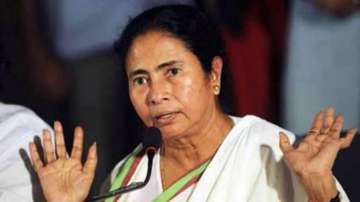West Bengal performed poorly in almost all governance issues: Survey
The West Bengal government has performed "poorly" in almost all governance issues, mainly on providing better employment opportunities, agriculture loan availability and higher price realisation for farm products, according to a survey released on Friday.

The West Bengal government has performed "poorly" in almost all governance issues, mainly on providing better employment opportunities, agriculture loan availability and higher price realisation for farm products, according to a survey released on Friday.
The West Bengal Survey Report 2018 also said the three issues -- providing better employment opportunities (for 39.28 per cent of survey participants), agriculture loan availability (35.86 per cent) and higher price realisation for farm products (35.21 per cent) -- which have been neglected by the state government are in the top priority list for voters in the state.
"The government has performed poorly in almost all governance issues, with the exception of average performance on matters such as empowerment of women and security and electricity for domestic use," said the report, which is the third part of the survey jointly conducted by the West Bengal Election Watch (WBEW) and the Association for Democratic Reforms (ADR) on 'Governance issues and Voting Behaviour 2018'.
The survey report was released on a day when Chief Minister Mamata Banerjee said at an election rally that the state government has won the United Nations Public Service Award for its Kanyashree programme, which was introduced in 2012 to aid the girl child in education and her wellbeing.
The WBEW is a civil society process, linked with NGOs ADR, New Delhi, and the National Election Watch India. This survey report has a dedicated chapter for West Bengal covering all 42 Lok Sabha constituencies in the state and approximately 21,000 voters as respondents.
The survey, which was conducted between October-December 2018, covered 534 parliamentary constituencies and more than 2.37 lakh voters.
It found that for the urban voters in West Bengal, the top most issues were providing better employment opportunities (45 per cent), reducing water and air pollution (39 per cent) and traffic congestion (39 per cent).
The state government performed poorly in providing better public transport (2.36) and reducing noise pollution in urban regions of the state, it stated.
On the voting behaviour of the electorates in the state, the survey said the highest percentage of voters felt that the chief ministerial candidate was the most significant reason for voting a candidate in an election.
While 38 per cent of the voters said this was important, 46 per cent felt it was "very important".
A large number of voters (67 per cent) said distribution of cash, gifts for polls were illegal, while 32 per cent said they were aware of instances where such inducements were offered in lieu of their votes.
"Ninety eight per cent voters felt that the candidates with criminal background should not be in Parliament or the state assembly, while only 36 per cent voters said they could get information on criminal records of the candidates," the report elaborated.
In relation to voting candidates with criminal antecedents, 36 per cent voters felt that people vote for such candidates because they were unaware about their criminal records.
In the opinion of 34 per cent voters, people vote for criminal candidates as they feel that the cases against such candidates were not of serious nature, the survey said.
Voters in West Bengal while voting for candidates with criminal records also keep in mind whether they were powerful (34 per cent), belong to the same caste or religion (33 per cent) or whether candidates were otherwise doing good work (34 per cent).
Seventy-four per cent of the people included in the survey were from rural areas, while 26 per cent were from the urban regions of the state. While 61 per cent were males, 39 per cent were females.
A total 63 per cent people surveyed were from the general castes, 23 per cent scheduled caste, seven per cent scheduled tribe and six per cent from the other backward classes.